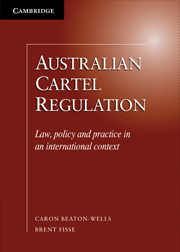Book contents
- Frontmatter
- Contents
- About the authors
- Preface
- Acknowledgements
- Abbreviations
- 1 Introduction
- 2 The legal framework governing cartel conduct
- 3 Collusion (contracts, arrangements, understandings)
- 4 Cartel and other provisions
- 5 Fault elements of the cartel offences
- 6 Individual liability for cartel conduct
- 7 Corporate liability
- 8 Exceptions
- 9 Enforcement policy
- 10 Immunity and cooperation policies
- 11 Sanctions
- 12 Compliance and liability control
- 13 Conclusion
- Appendix Trade Practices Act 1974 (Cth) Pt IV Div 1; Pt IV Div 2 s 45
- Index
9 - Enforcement policy
Published online by Cambridge University Press: 05 December 2011
- Frontmatter
- Contents
- About the authors
- Preface
- Acknowledgements
- Abbreviations
- 1 Introduction
- 2 The legal framework governing cartel conduct
- 3 Collusion (contracts, arrangements, understandings)
- 4 Cartel and other provisions
- 5 Fault elements of the cartel offences
- 6 Individual liability for cartel conduct
- 7 Corporate liability
- 8 Exceptions
- 9 Enforcement policy
- 10 Immunity and cooperation policies
- 11 Sanctions
- 12 Compliance and liability control
- 13 Conclusion
- Appendix Trade Practices Act 1974 (Cth) Pt IV Div 1; Pt IV Div 2 s 45
- Index
Summary
Introduction – the role of enforcement policy in an anti-cartel regime
Much of this book concerns issues associated with the design of Australia's legislative scheme in relation to cartel conduct. This chapter recognises the importance of an enforcement policy in supporting the legal regime. Such a policy is relevant in identifying and explaining the roles of different institutions in enforcement of the law and the approach that will be taken by such agencies in formulating enforcement responses. In Australia, there are two particular factors influencing the design of anti- cartel enforcement policy.
The first relates to the structure and nature of the legislative scheme itself. As discussed in other parts of this book, by virtue of the amendments made to the TPA by the CC&OM Act, Australia has a dual civil/criminal regime that applies both civil and criminal liability to conduct with the same physical elements. This structure means that persons may be subject to dual proceedings and penalties. Added to this, the prohibitions are excessively broad and capture conduct that is not substantially anti-competitive. As a result, the legal framework relies heavily on the exercise of administrative discretion by enforcement agencies to determine when it is appropriate to take enforcement action, whether to do so as a civil or criminal matter and, subject to the legal protections against ‘double jeopardy’, when to take both civil and criminal action and in which order.
The second factor of particular relevance to Australia’s policy framework relates to the institutions involved in enforcement. Owing also to the dual civil/criminal nature of the regime, there are two agencies involved in various ways in enforcement – the ACCC and the CDPP. This has necessitated joint formulation of policy by the two agencies regarding their roles and relationship and, in particular, consideration of the extent to which the CDPP’s traditional approach to prosecution needs to be modified or tailored to accommodate the specific challenges of cartel enforcement.
- Type
- Chapter
- Information
- Australian Cartel RegulationLaw, Policy and Practice in an International Context, pp. 337 - 377Publisher: Cambridge University PressPrint publication year: 2011



